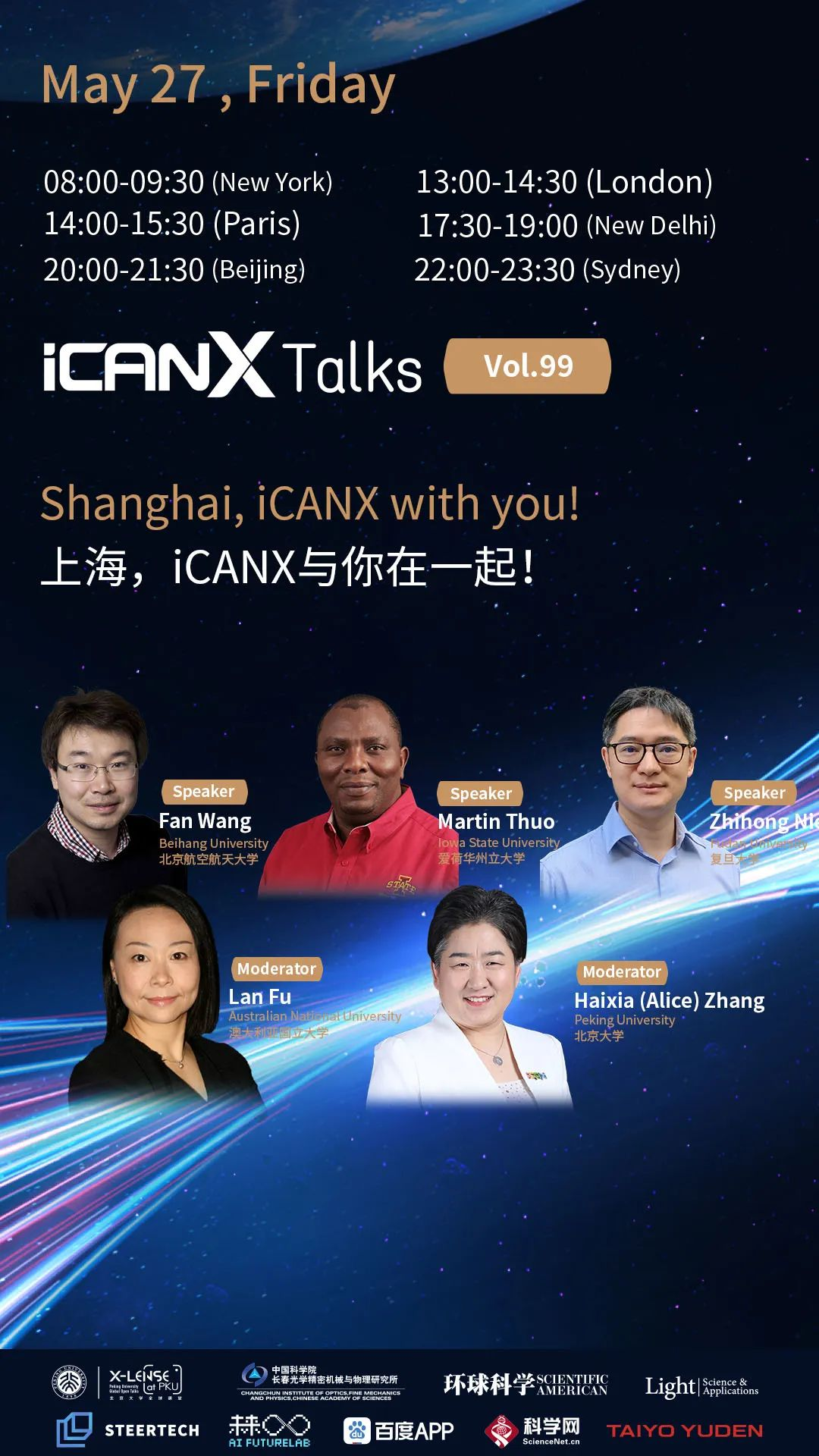[Lecture] iCANX Talks Vol. 99
May. 27, 2022
Host:
Lan Fu, professor, Australian National University
Haixia (Alice) Zhang, professor, Peking University
Time: 20:00-21:30 pm, May 27, 2022 GMT+8
Venue: Scan the QR code
Theme: How to prepare the academic presentation
Speaker: Fan Wang, Professor, Beihang University
Abstract:
Academic
presentation is crucial for our scientific career and even for success
in life. Speech delivery is a necessary weapon of survival and mostly
ignored by us, therefore leaving us vulnerable when combating our
counterparts. All of us wish to achieve our maximum potential in our
scientific career by dint of academic speech, the question is how can we
do that? Well, in today’s lecture, Fan Wang, professor of BUAA, will
share with us his philosophies and empiricism of academic presentation.
The lecture will contain three key points: 1. Preparation: know your
audience and duration of presentation to vary your focus. 2. PPT design:
content layouts of every single slide and the logic of PPT 3.
Presentation technique: give the audience the “immersion experience” and
how to accomplish it. To learn and apply those three points by heart,
you will be a fluent presentation giver and conquer the Oscar Hall of
academia.
Biography:
Prof
Fan Wang leads the biophotonics research group at the Beihang
University. Dr Wang has expertise in optoelectronics, biophotonics, and
nanomaterials. He also has expertise in biophotonics application of
nanomaterials, including super-resolution microscopy, optical tweezers,
single nanoparticle tracking and sensing. Dr Wang has published over 70
peer-reviewed journal articles (include 13 Nature series journals) with
an h-index of 30 and over 3802 citations. Dr. Wang obtained his Ph.D.
from the University of New South Wales in 2014. In 2019, Dr Wang was
awarded the UTS Chancellor’s Postdoctoral Research Fellowship to
establish his biophotonics research team. In 2020, he obtained the
Discovery Early Career Researcher Award to conduct his biological laser
cooling technology research, and he joined the School of Electrical and
Data Engineering to establish his group. In 2021, he was awarded the
David Syme research prize due to his biophotonics research. In 2022, he
joined Beihang University to establish his group in China.
Theme: Scientific Story Telling: How to write
Speaker: Martin Thuo, Iowa State University
Abstract:
A
scientific paper tells a story, not the history, using a set of data. A
good story, however, is based on conflict/crisis and their resolution –
the so-called plot. Other elements of a story are i) the setting (where
the story is taking place), ii) theme (what the author is trying to say
about the subject – the main character learns), iii) characters/actors
(protagonist, antagonist, confidant etc), iv) Perspective (point of view
from which the story is told) and v) the narrative (dramatic) arc which
captures the dynamic/progressive nature of the story – it contains the
set-up, rising action, climax and a resolution (where the main
character’s journey ends). This talk will explore how these elements of
story telling are adapted in the construction of a paper and how the
data guides the plot and the writer. Relation to other well-known
stories will be highlighted.
Biography:
Martin
Thuo is the Schafer professor in the department of materials science
& engineering and electrical & computer engineering (courtesy)
at Iowa state University. Prior to his independent career, he was a
postdoctoral fellow at Harvard University. His work has been recognized
by C&EN as a materials chemistry development of the year (2016), by
IDTechEx with a technical development of the year award in Printed
electronics, and has been feature across various platforms including
Forbes, nature news, C&EN among others. He is a co-host and
co-organizer of the ICANX talks. Select honors include Mary-Fieser
fellowship (Harvard University), ACSnano rising star, Research
excellence award (Iowa State), Black & Veatch faculty fellowship,
Visiting professorship (3SR and G2E labs, Grenoble), Schafer 2050
challenge professorship, among others. His research interests include
metastable materials, applied nanoscience, self-assembly, surface and
interface, molecular electronics, and frugal innovation.
Theme: Graduate Research: How to Succeed in the Lab
Speaker: Zhihong Nie, Fudan University
Abstract:
In
this talk, I will present the key to the success of graduate students
working in the laboratory, especially for junior ones who are still
trying to identify their directions. More specifically, I will discuss
this topic from several aspects including personal values, approach to
creativity, and time management for students.
Biography:
Zhihong
Nie is a Professor in the State Key Laboratory of Molecular Engineering
of Polymers and Department of Macromolecular Science at Fudan
University. Prior to this, he was a tenured Associate Professor at the
University of Maryland College Park. He received his Ph.D. degree from
the University of Toronto in 2008 and then did two-year postdoctoral
research at Harvard University. He is the recipient of NSFC
Distinguished Young Scholars, NSF CAREER Award, 3M Non-tenured Faculty
Award, ACS PRF Doctoral New Investigator Award, etc. His research
interests include molecular and nanoparticle self-assembly, biomedical
imaging and delivery, programmable soft and plasmonic materials.
Source: iCANX

